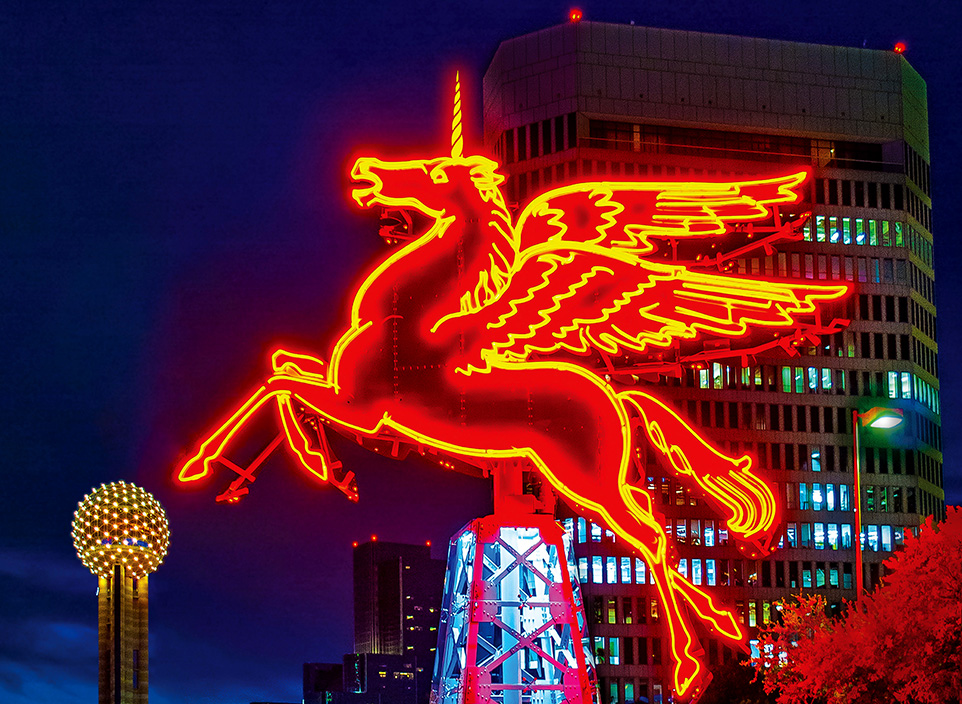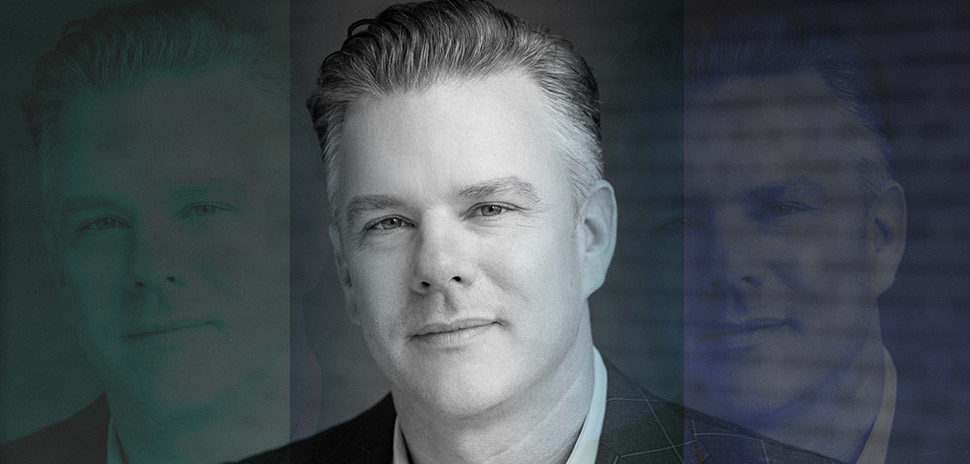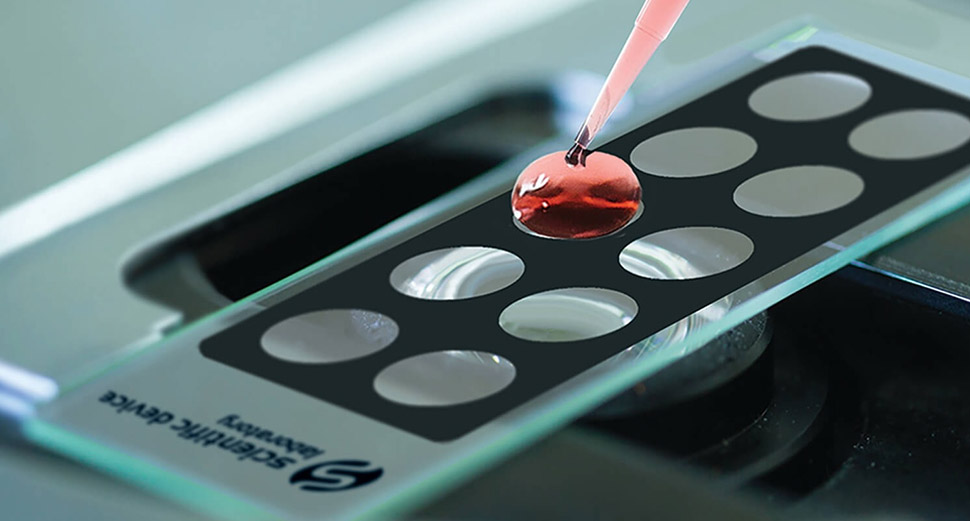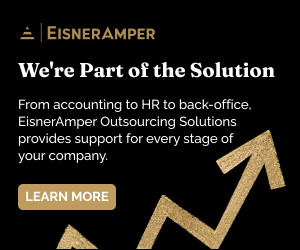This story was originally published in Dallas Innovates 2020: The Magazine.
A new wave of unicorns is coming. If history is any guide, this is where things get interesting for Dallas-Fort Worth.
Many of the best early commercial uses of the internet, such as Facebook, WordPress, and YouTube, emerged in the last decade after the technology bubble burst in the ’90s. With investment capital scarce, entrepreneurs had to grow businesses on a shoestring.
Startups improve their chances of success when veterans of an industry build a better mousetrap to solve a nagging problem in that field, research has found. That’s been the formula for North Texas companies such as SoftLayer (web hosting and managed services), TransFirst (payments technology for merchants), and most recently, biotech Peloton Therapeutics, which was bought by Merck & Co. for $2.2 billion.
“If there’s a Texas or Dallas difference as opposed to Silicon Valley, investors tell me the business value we create has a firm base in reality. We are not applying unreasonable multiples to the growth and revenue we generate. In Texas, growth precedes value—not the other way around.”
— DAVE COPPS, WORLDS INC.
As a few well-known early unicorns—private companies valued at $1 billion-plus—have returned to earth in terms of valuations nationwide, the range of industries in Dallas-Fort Worth makes us a seeding ground for the next version of the mythical beast—one that will grow in value by fixing problems instead of speculative investing.
Here, we give a high-level look at the markets that 20-plus experts expect to produce the next generation of great Dallas-Fort Worth companies. They span high-profile fields like financial technology and surprising areas like video games and medical diagnostics.
“Hypergrowth has to be based in revenue and traction,” says Dave Copps, CEO of Dallas-based artificial intelligence firm Worlds.io. Copps is on his fourth startup with three successful exits.
![Worlds Inc. CEO and founder Dave Copps [Photo: Michael Samples]](https://s24806.pcdn.co/wp-content/uploads/2020/03/Screen-Shot-2020-03-04-at-6.33.13-PM.png)
Dave Copps, CEO and founder of Worlds Inc., an AI startup spun out of Hypergiant Sensory Sciences in February.
“If there’s a Texas or Dallas difference as opposed to Silicon Valley, investors tell me the business value we create has a firm base in reality. We are not applying unreasonable multiples to the growth and revenue we generate. In Texas, growth precedes value—not the other way around,” Copps says.
Investors value the deep industry experience available in these parts because it can add expertise, connections, and, particularly in high-uncertainty fields like technology, better forecasting. An analysis of 101 startup postmortems found the top reason for failure was “no market need.”
That’s something investors such as David Sym-Smith, venture partner at Addison-based Mobility Ventures, have high on their lists. “Show me you are an expert in the field and that you have a clear plan in place,” he says.
And local startups that have identified a clear market need, like ParkHub, are working to draw investors’ attention to the region. The Dallas parking-tech company attracted 100-plus executives and capital providers from across the country to a September conference here surrounding a $5 million venture-debt financing it landed from Bridge Bank.
“We hoped the event would reflect our gratitude for the investors and partners that have supported us throughout our journey as a company and our appreciation for the continually evolving landscape,” ParkHub founder George Baker says.
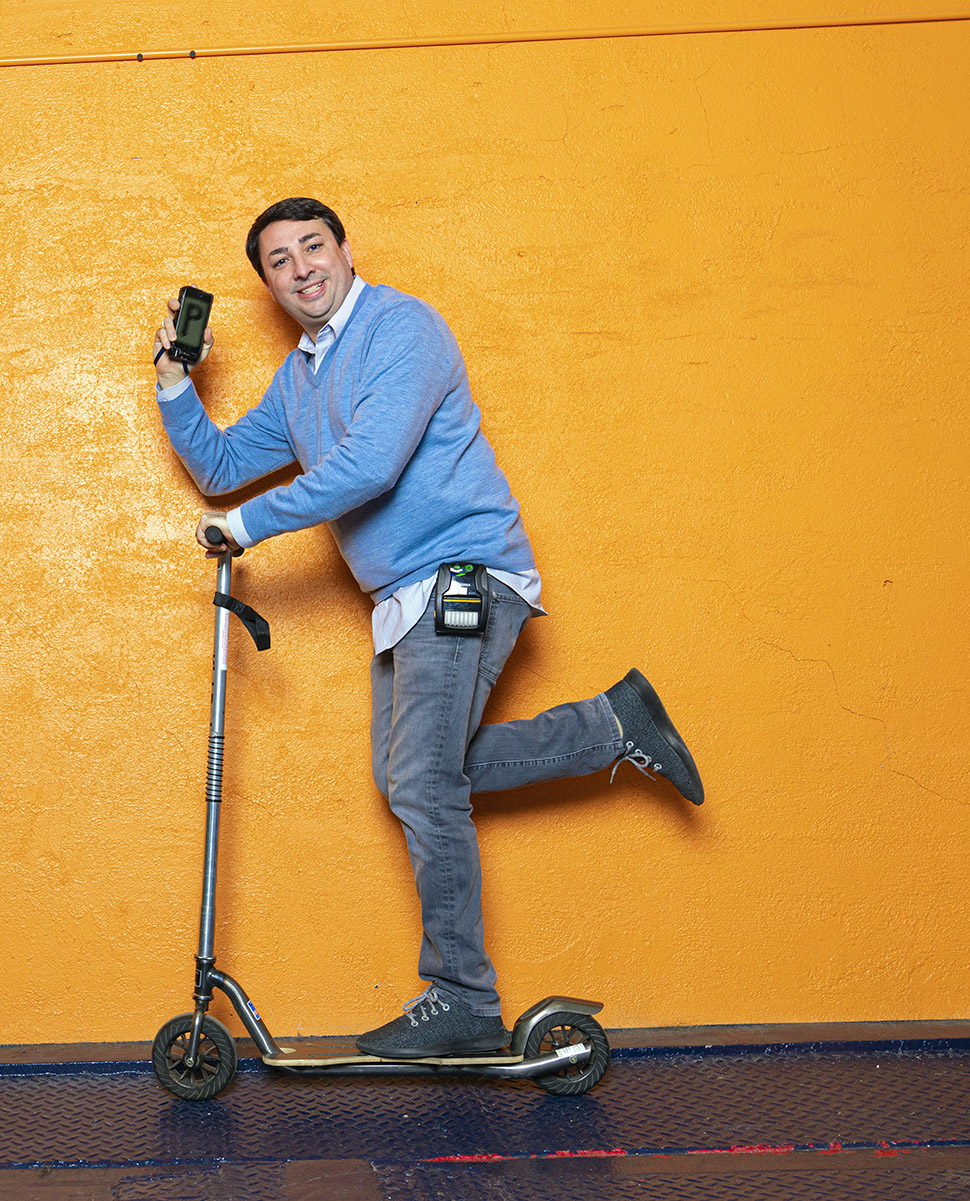
To draw attention to investment opportunities outside of the two coasts, George Baker’s ParkHub plans more events like the September conference it co-hosted in Dallas that attracted more than 100 executives and capital providers from across the country. The event centered on a $5 million venture-debt financing the company received from Bridge Bank. [Photo: Rebeca Posadas-Nava]
Another new venture launched by nine local dealmakers—aptly named Venture Dallas—aims to further position North Texas as an investment catalyst. The conference drew 130 registered investors from 15 different states and some 37 cities in its inaugural year.
The two-day summit held in September highlighted startup opportunities and big-name speakers talking tech, funding, and growth.
Organized by seven local investors from Capital Factory, Cypress Growth Capital, Intelis Capital, JF2 Capital, Perot Jain, and Silicon Valley Bank, and two Dallas Regional Chamber leaders, Duane Dankesreiter and Natalie Pazera, the event drew both luminaries (Bill Nye the Science Guy, Emmitt Smith) and upstarts with startups—all aiming to connect and collaborate on projects and ideas.
“Venture Dallas is everything from Dallas icons getting up and sharing their accomplishments to why we, as a general public, should be excited and enthusiastic about what’s happening here in Dallas from an early-stage perspective,” Aaron Pierce, managing director at JF2 Capital and a member of the host committee, said.
After its first-year success, Venture Dallas is slated for a return in September 2020.
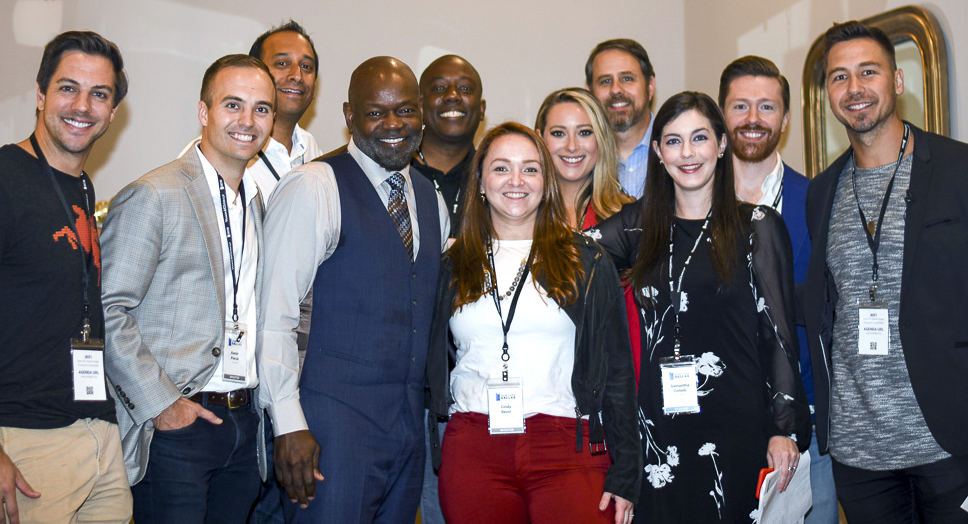
Speakers at Venture Dallas included Emmitt Smith of E Smith Legacy Holdings, pictured here with the Venture Dallas host committee. From left are Bryan Chambers, Capital Factory; Aaron Pierce, JF2 Capital; Vik Thapar, Cypress Growth Capital; Emmitt Smith, E Smith Legacy Holdings; Joe Beard, Perot Jain; Cindy Revol, Perot Jain; Natalie Pazera, Dallas Regional Chamber; Duane Dankesreiter, Dallas Regional Chamber; Samantha Colletti, Silicon Valley Bank: and Jonathan Crowder, Intelis Capital.
Necessary partnerships
Even better, the diversity of the DFW economy provides opportunities in markets that require leading companies in multiple industries to work together, such as the Internet of Things or IoT.
“Cities that historically dominated only one or two industries are going to be left out of the larger plays.”
— PAUL NICHOLS
“Cities that historically dominated only one or two industries are going to be left out of the larger plays,” says Paul Nichols, executive director of the Institute for Innovation & Entrepreneurship at The University of Texas at Dallas. “Dallas-Fort Worth is fortunate in that we have so many industries represented in one location that it’s far easier for those different groups to get together, collaborate, and build the necessary partnerships.”
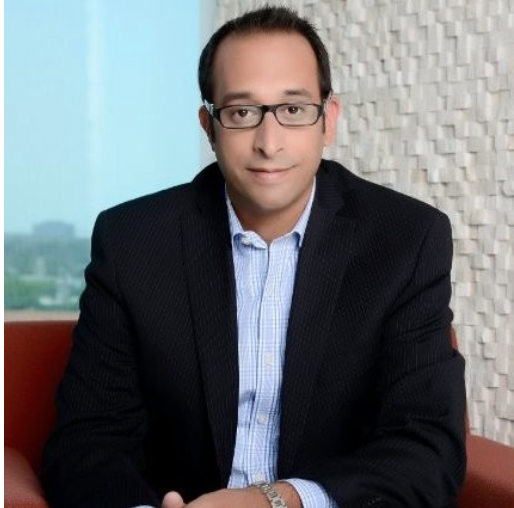
Cypress Growth Capital Partner Vik Thapar
Opportunities here in early-stage investing are increasingly attracting attention from out-of-town firms that participate in first-round deals, according to Vik Thapar, partner at Cypress Growth Capital. The Dallas firm provides growth capital in exchange for a fixed percentage of a company’s revenue.
“I see more businesses moving to DFW and more investors making Dallas a market they are betting on,” he says. “Companies approaching unicorn status can be in Dallas.”
Unicorns are real
Emerging players are already trying to disrupt industries by piggybacking on DFW’s strengths. In financial technology, or fintech, Plano’s Alkami Technology, which helps provide online banking services, is taking advantage of the area’s talent base in both technology and financial services.
Some area investors are kicking tires in that industry.
“Next year, we will continue to focus on the financial vertical (fintech), including payments and financial services,” says Pierce, managing partner at Dallas-based JF2 Capital, which invests for a wealthy family. The firm will also evaluate other markets, he adds.
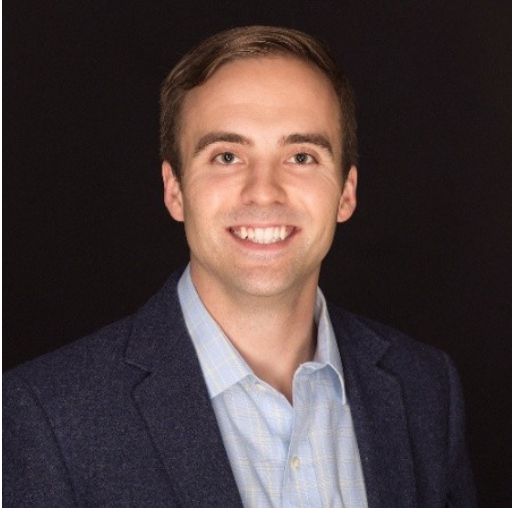
JF2 Capital Managing Partner Aaron Pierce
“One trend I am keeping an eye on is disruption within private markets in terms of investing,” he says. “I’m interested in how technology and broader access will disrupt a largely opaque market of investing.”
Duncan MacFarlane, who runs the Hart Institute for Engineering Leadership at SMU, points to Catalyze Dallas, which helps defense contractors and other industrial companies find new ways to make money from their inventions and other creations.
“There’s a great opportunity to spawn a tremendous number of companies in hardware and aerospace,” he says.
The cluster of semiconductor-related companies around Dallas’ Texas Instruments provides opportunities in photonics—or using light to create energy or detect or move information—and lasers, he added.
“In Richardson, IntelliEPI for 20-plus years has been supplying high-end semiconductor material,” MacFarlane says. “Year after year, they have interesting, quiet growth.”
To address the challenge of tech talent, the region might offer courses on easy-to-use design packages that have emerged for engineering and software, he says. “If we could give a short amount of training to folks working in coffee shops, that might help them move from $30,000 jobs to $80,000 jobs.”
Industry hotspots
Entrepreneurs will use AI to attack problems in everything from healthcare and energy costs to diseases, Copps says.
“In the next 10 years, we’re going to see 100 years of progress,” he says. “It’s going to be 10 times the acceleration of anything we’ve seen before.”
The region’s technology base has helped make Dallas the No. 2 hotspot nationally, behind Los Angeles, for esports, or competitive multiplayer video games, according to Randy Chappel, who directed investments in the industry by the family of Ken Hersh, founder of Irving-based NGP Energy Capital Management.
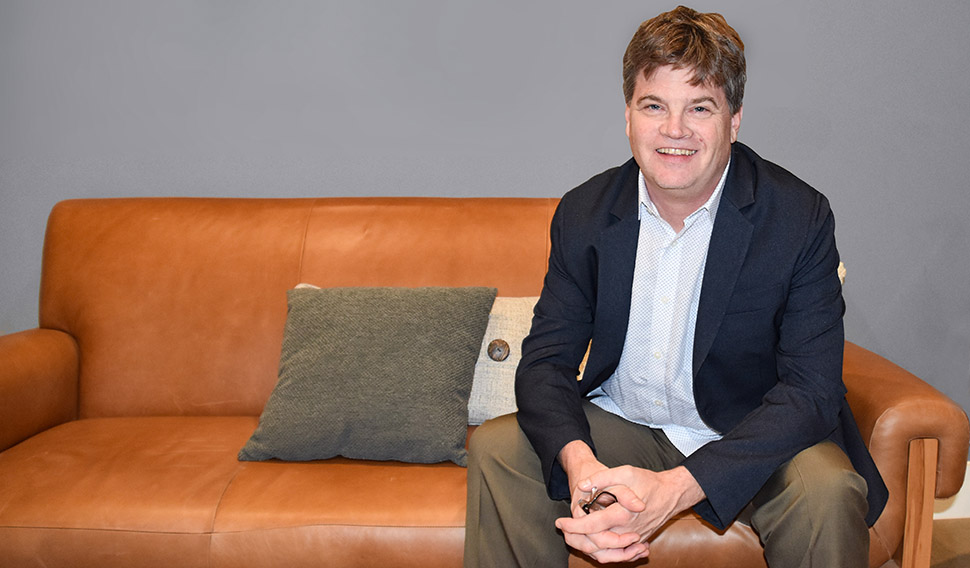
PLAYING GAMES: “Overwatch the (video) game has sold more than 300,000 copies in DFW alone. That’s more than double the number of high school football players in the entire state of Texas, “ Randy Chappel, managing director, Hersh Family Investments says.
Esports events draw large crowds of millennial and Generation Z fans, Chappel says. “It’s a really impossible demographic for a lot of advertisers and sponsors. They really don’t watch a lot of TV.”
Another under-the-radar opportunity for DFW is its growing base of cybersecurity professionals who arrived as part of their big-company employers moving their network operations here.
READ NEXT Meet Night Media: The Dallas Digital Talent Agency Behind Some of the World’s Biggest YouTube Stars
Aside from importing potential entrepreneurs, it means area startups in the field have local decision makers at Fortune 500 companies to evaluate their creations, according to Ram Dantu, director of the Center for Information and Cyber Security at the University of North Texas.
“I’ve recently heard there are a lot of venture capitalists in Dallas who want to fund small companies in the space,” he says.
Count Mobility Ventures as one firm that sees opportunity in the field.
“As long as we have hackers, we will have cybersecurity as an emerging technology, because it will constantly evolve to defend against them,” Sym-Smith says.
Where the hockey puck is going
Investors have already found growing cybersecurity companies like Dallas’ StackPath, which CrunchBase reports raised a total of $180 million, and Richardson’s Armor Defense ($149.1 million).
Going forward, look for North Texas entrepreneurs to exploit the 313,735-plus unfilled cybersecurity jobs nationwide by automating labor-intensive work that people currently do.
And don’t be surprised if someone uses machine learning to separate benign traffic on a network from the malicious variety.
“This would be an area well suited for those technologies,” says Frederick Chang, who runs the Darwin Deason Institute for Cyber Security at SMU. “Machine learning is good at differentiating two things.”
The job of protecting information bleeds over to transportation, the industry that arguably is receiving the most creative-related effort in DFW.
Real estate titan Ross Perot Jr. is turning his 26,000-acre AllianceTexas development in Fort Worth into a zone for testing anything from self-driving cars to drones.
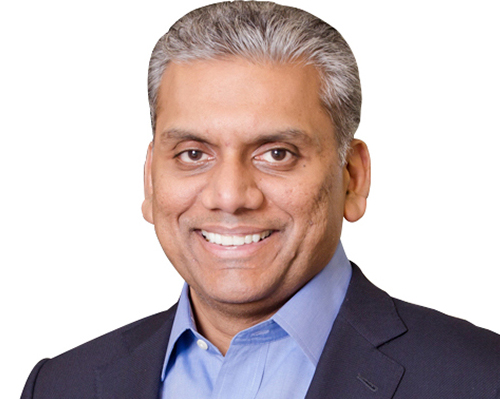
Anurag Jain, co-founder and managing partner of Dallas Venture firm Perot Jain
“What we’re building at Alliance are the technologies that will be the sandbox for creating the next generation of mobility,” says Anurag Jain, co-founder and managing partner of Perot Jain, a Dallas venture firm in which the developer has a stake.
Mobility is one of seven trends that Jain has identified for the firm’s investments to pursue.
Ironically, many transportation-related criticisms North Texas receives, such as traffic congestion and urban sprawl, could lead to more startups here tackling issues in that arena, according to Kevin Stevens, partner at Intelis Capital, a Dallas venture firm.
“Clearly, something is happening with DFW with mobility,” he says. “For years, we’ve heard that Dallas needs more ‘density’ for startup growth. It could end up that our lack of density spurs an ecosystem around mobility and creates the blueprint for other metros looking to reduce traffic and carbon footprints.”
While startups like the Dallas ride-sharing shop Alto ($14 million raised) could blossom into unicorns, one of the biggest growth areas in the local transport arena is as old as the hills: third-party logistics, or 3PL, meaning helping move other people’s freight from points A to B.
“The transportation industry has been here for so long that everybody (in 3PL) is in niches, with strong competitors in each. So no one stands out, which I’d argue is good for DFW,” says Edmund Prater, who runs the Veterans Business Outreach Center at the University of Texas at Arlington.
He cites the example of Birmingham, Alabama, which in the 1960s was vying with Atlanta for a regional airport hub the federal government was considering.
“Birmingham’s economy was controlled by U.S. Steel,” Prater says. “The government did not want the competition for jobs, which would have forced a rise in labor rates. So Atlanta got the airport.”
While it may sound like a cliché, Dallas/Fort Worth International Airport remains a key draw to the region for innovative companies and people.
Southlake is headquarters for OncoNano Medicine, a medical specialty company, in part because the airport is easy to get to.
“The proximity to Dallas Fort Worth International Airport is important when employees travel and investors, vendors and other visitors come to meet with the company,” says Ravi Srinivasan, OncoNano’s CEO and co-founder.
Custom medicine
Though Dallas-Fort Worth may be better known for technology, defense, and logistics, wellness and life science startups are quietly popping up throughout the region—often in conjunction with nearby universities.
In Addison, MyndVR got early help from UT Dallas associate professor Ryan McMahan and his graduate students in creating virtual reality therapy so the elderly can experience with a headset anything from nature to live music or art.
Since launching in mid-2018, the company has provided some of its 360-plus applications to 35 operators of senior living communities in 25-plus states, according to co-founder and CEO Chris Brickler.
READ NEXT The (Alcon) Family Tree: How One Company Seeded a DFW Life Science Legacy
The company in 2018 unveiled a research coalition with six organizations, including UT Dallas, to study how virtual reality impacts the aging mind. “We are making no medical claims at this time,” Brickler says. “Early research suggests a very bright future for this next-generation wellness modality.”
In a similar vein, UNTHSC is looking at developing medical devices in conjunction with fledgling companies such as Fort Worth’s Neuro Rehab VR, which provides a virtual reality system that physical therapy patients can use while receiving treatment. “Almost half of all Americans will see a physical therapist this year, and we believe there is tremendous opportunity to improve outcomes and bring new innovations to this growing industry,” says Cameron Cushman, director of innovation ecosystems at the school.
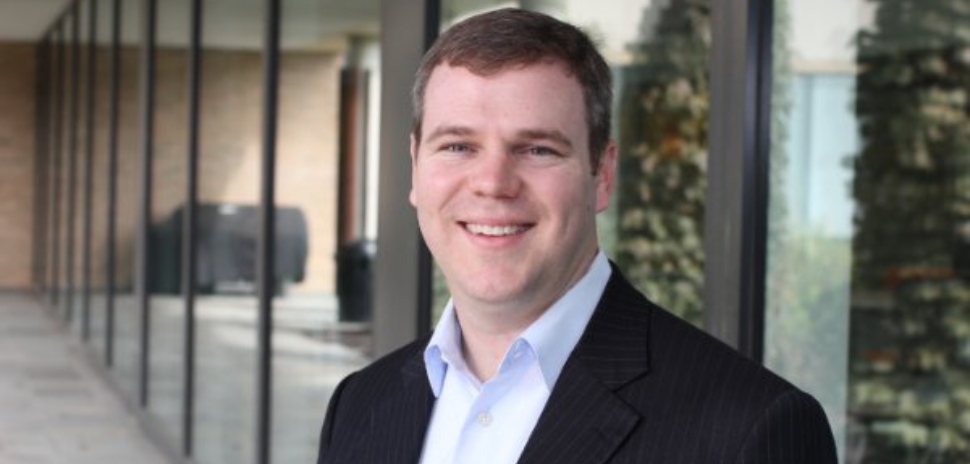
Cameron Cushman [Photo: Courtesy Alexander Branch]
At least four more diagnostic companies are growing in laboratory spaces of its Discovery Centers, Cushman says.
One of UNTHSC’s internal startups, Cx Precision Medicine, is developing what would be the first-ever blood test to screen for Alzheimer’s disease, according to Dr. Michael Williams, president of the Fort Worth school.
“In the near future, the promise of precision medicine tailoring treatments to specific patients or populations will create abundant opportunities for new diagnostics companies,” he says.
Another local startup, Nano Liquid Solutions tests blood with a single drop. While that could call up comparisons to Theranos, founder and CEO Ali Farzbod says the notorious startup with near-miraculous claims about blood testing actually provided inspiration. Farzbod was designing an efficient wastewater monitoring device as his Ph.D. project at the University of Texas at Arlington. During the second year of his Ph.D. program, Theranos put blood testing on his radar as a potential application for his monitoring devices. Farzbod made the pivot.
“The most important advantage is that we are integrating a cloud-based data system into our devices for the patients to centralize all the blood data in their lifetime,” he says.
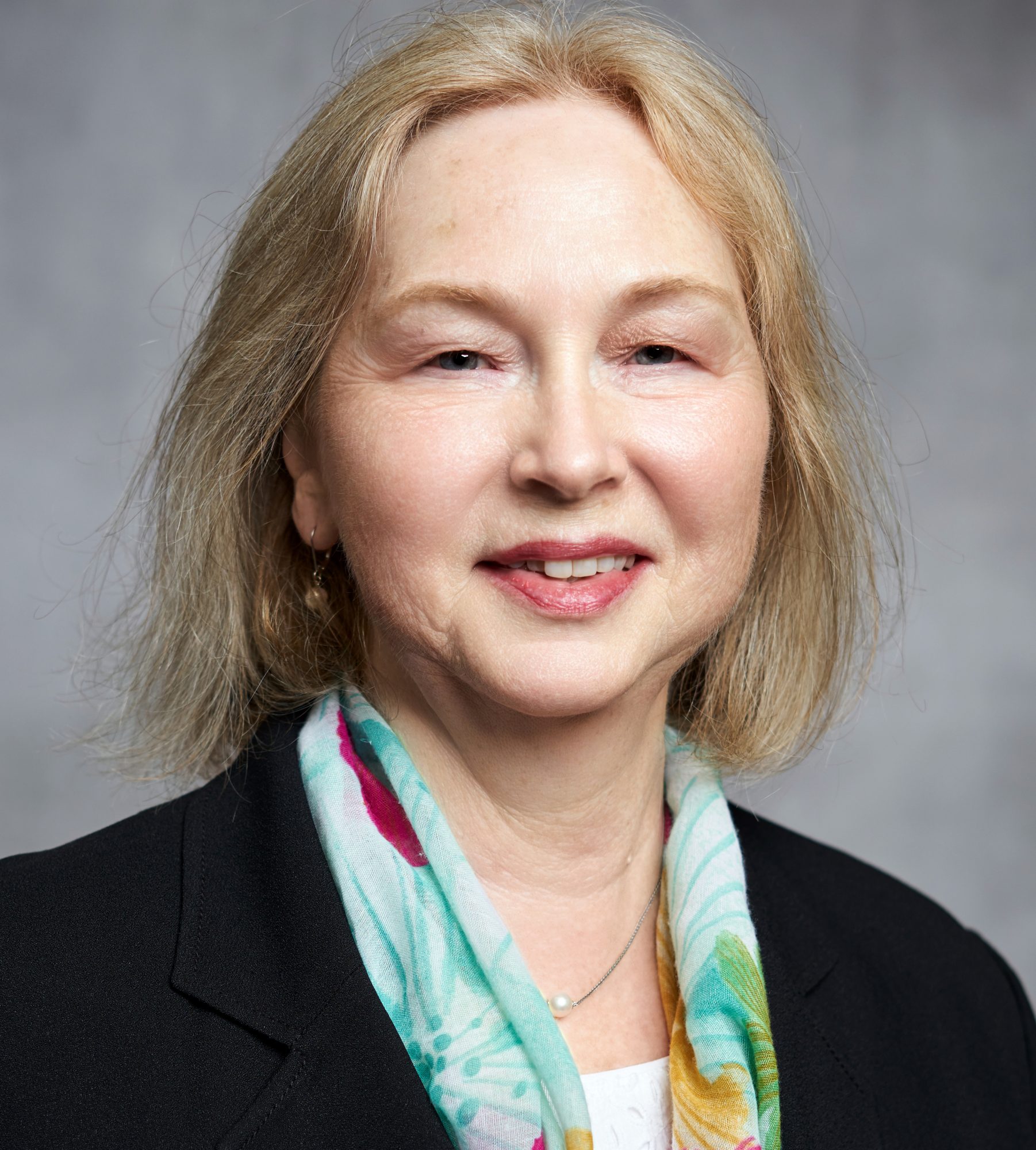
Stella Robertson, Bios Partners
Medical diagnostics could be a strength for North Texas, partly because of expertise in identifying areas of need that can found in local medical schools, hospitals, and healthcare systems, according to Stella Robertson, co-founder of Bios Partners, a Fort Worth-based venture firm that invests in biotechnology and medical devices.
Those institutions also have the people who can create kits, procedural diagnostic products, or software-enhanced systems for checking on health maladies, Robertson says. “Engineering and software technology is available from DFW businesses and universities to help with the development.”
Similar intellectual horsepower could also fuel growth of developers of specialty drugs and other therapies for particular diseases, according to Robertson, who has a Ph.D. in biology-immunology from Johns Hopkins University.
Several such companies have already been launched by former employees and board members of Alcon, the eye care products maker whose U.S. operations are based in Fort Worth.
Others are coming out of research hubs, such as the University of Texas Southwestern Medical Center, whose scientists created a digital nanosensor that OncoNano is trying to turn into a tool for distinguishing cancerous tissue and delivering drugs for fighting the disease.
“Our research and manufacturing teams are entirely Texas-based,” Srinivasan says. “We have also been able to source in the DFW area experienced candidates in clinical, regulatory affairs, procurement, and finance.”
Emerging interest in life science-related entrepreneurship comes in conjunction with health services becoming a more important part of the economy on the west side of Dallas-Fort Worth. In a six-county area that includes Tarrant, employment in health services grew 30 percent between 2010 and 2017, according to the Federal Reserve Bank of Dallas.
That was the third-fastest rate among industry clusters in that area, Fed researchers found. It also made health services as the second-largest industry cluster there, accounting for 11.3 percent of all jobs in the broader 13-county Dallas-Fort Worth metropolitan statistical area.
Diverse teams drive better outcomes
As the region’s multiplicity of industries creates a wide range of early-stage opportunities, investors are also backing a broader array of people.
“There’s been an uptick in investments that fund more diverse teams, which will ultimately drive better business outcomes.”
— RACHEL WEST
“There’s been an uptick in investments that fund more diverse teams, which will ultimately drive better business outcomes,” says Rachel West, director of business development at Dallas’ RevTech Ventures.
Various studies have found that groups make better decisions when their members have different viewpoints, as it forces them all to sharpen their arguments.
Entrepreneurs and check-writers alike are also rethinking the definition of a successful exit or cashing in of their chips.
“Sometimes people become too focused on unicorns,” says Laura Baldwin, co-chair of office hours for the Dallas chapter of Golden Seeds, which invests in women entrepreneurs. “Companies do not have to be unicorns to have great exits.”
Entrepreneurs like David Meadows prove the point.
Since leaving an executive role at pharmaceutical giant Novartis in 2012, Meadows has started eight companies, including Colleyville’s Sentinel Diagnostics Imaging and Grapevine’s Purewine.
To date, he’s had three successful exits, with none of his startups failing. “An exit doesn’t have to have an IPO,” he says. “It can be a license of your technology to other comarketing or development companies. That’s what I’ve done.”
As values of one-time investor darlings like WeWork have fallen this year, shareholders in private companies have become more selective in what they try to take public.
But high-growth companies are something that investors will always gravitate to. These days, the big are getting bigger.
“IPOs these days seem to be much more focused on ‘decacorns,’ worth $10 billion-plus, than unicorns,” says Bryan Chambers of Capital Factory, the “center of gravity” for Texas entrepreneurs.
Higher education works together
Since he came to North Texas 30 years ago, SMU’s MacFarlane has seen sharp improvement at research coming from all area universities. “One of the cool things is that these institutions don’t compete. They collaborate every chance they get, uniformly in service to the DFW area,” he says.
With a large number of engineering professors across the region, “you have a good support system for the brain trust,” the term academics now use for the region’s collective mind power, he says.
Beyond four-year universities, the area benefits from a strong community college system for providing technical training, according to Nichols of UT Dallas. “Companies will only locate here if they have the talent.”
As higher ed improves, area cities are working to become startup friendly as well. To boost research-and-development spending, Fort Worth recently became one of the first nationwide to offer an R&D tax credit.
And while it may be a first step, the creation of Bios Partners provides hope that more capital may find its way to young life sciences firms.
“We have to walk before we run,” says Hubert Zajicek, CEO and co-founder of Health Wildcatters, the acclaimed Dallas accelerator. “Things are looking good, and there is no reason it couldn’t be 10 times better in five years.”
Read it online
Dallas Innovates 2020: The Magazine highlights Dallas-Fort Worth as a hub for innovation. Our third annual print publication declares “The Future is Here.” It’s a moment for innovation in Dallas-Fort Worth, one that we’ve been working toward for a long time.
![]()
Get on the list.
Dallas Innovates, every day.
Sign up to keep your eye on what’s new and next in Dallas-Fort Worth, every day.










